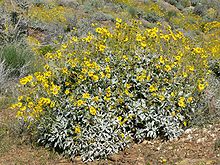Encelia
| Encelia | |
|---|---|
 |
|
|
Encelia farinosa near Palm Springs, California |
|
| Scientific classification | |
| Kingdom: | Plantae |
| (unranked): | Angiosperms |
| (unranked): | Eudicots |
| (unranked): | Asterids |
| Order: | Asterales |
| Family: | Asteraceae |
| Tribe: | Heliantheae |
| Genus: |
Encelia Adans. |
| Synonyms | |
|
|
Encelia is a genus of the plant family Asteraceae. It consists of shrubs (and one geophyte) of arid environments in southwestern North America and western South America.
All have n = 18 chromosomes. All the North American species are obligate outcrossers. In cultivation, the species readily form fertile F1 hybrids, F2s, and backcrosses, but in natural areas of sympatry, F2s and backcrosses are absent or rare.
Encelia species are used as food plants by the larvae of some Lepidoptera species including the leaf miner Bucculatrix enceliae which feeds exclusively on Encelia farinosa.
The phylogenetic sister group of Encelia is a clade comprising the genera Enceliopsis and Geraea. The three genera are informally called the "Encelia alliance".
Encelia is named in honor of German biologist Christophorus Enzelius, 1517–1583.
...
Wikipedia
